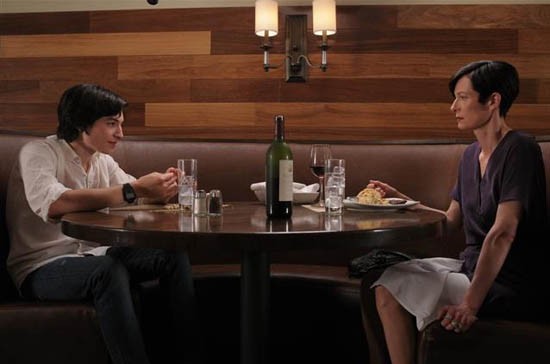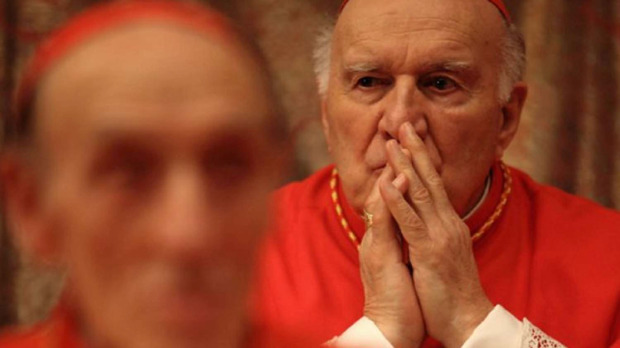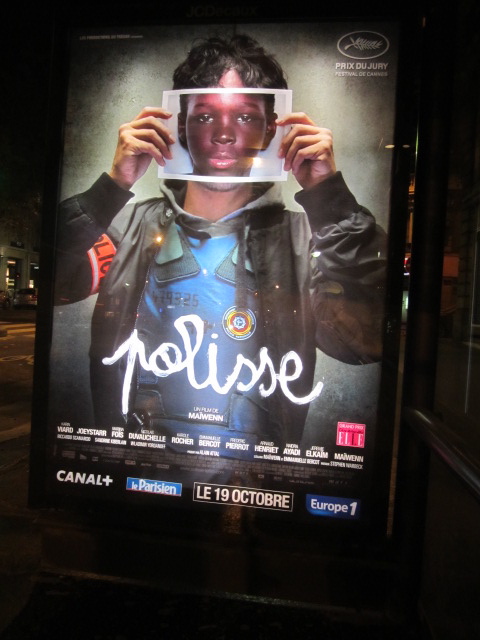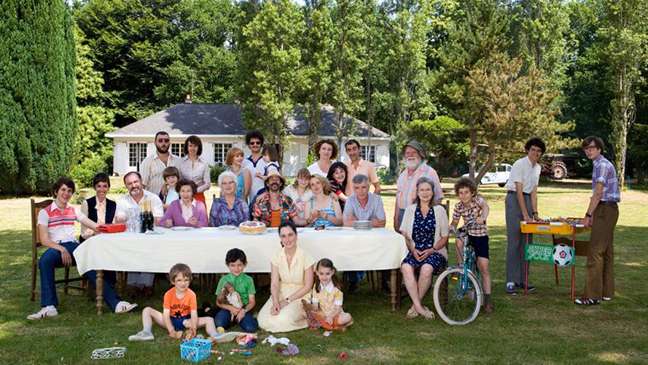-
Paris movie report (october 2011)
PARIS MOVIE REPORT II (2011)
I'm in Paris again for a little while and as in my PARIS MOVIE REPORT (MAY 2011), I'll file some reviews of or comments on the films I manage to see between other activities. Links to individual reviews will be below.
Chicken with Plums (Vincent Paranaud, Mariane Satrapi 2011)
Habemus Papam (Nanni Moretti 2011)
House of Tolerance (2011) (L'Apollonide: Souvenirs de la maison close, Bertrand Bonello 2011)
Minister, The (L'Exercise de l'Étât, Pierre Schöller 2011)
Outside Satan ( Hors Satan, (Bruno Dumont)
Polisse (Maïwenn 2011)
Skylab, Le (Julie Delpy 2011)
Un été brûlant (Philippe Garrel 2011)
We Need to Talk About Kevin (Lynne Ramsey 2011)
Where Do We Go Now? (Et maintenant, on va où?, Nadine Labaki 2011)

PARIS, VIEW OVER THE SEINE FROM THE PONT ROYAL BY C.K.
Last edited by Chris Knipp; 06-18-2021 at 11:16 PM.
-

EZRA MILLER AND TILDA SWINTON IN WE NEED TO TALK ABOUT KEVIN
Hideous child
Alas, they never do talk about Kevin. Not much. And they don't act in time, if there was something they could do. Mom (Tilda Swinton) knows from early on that he's a bad seed, but, between moments of anger and outrage, seems dominated by either blind affection or a misguided conviction, possibly born of liberal guilt, that all sociopathic teenagers need is love. As for dad Franklin (John C. Reilly, a bit too bland and good-natured as in Polanski's upcoming Carnage), he just thinks it's a stage the boy's going through. So Kevin, on the cusp of his sixteenth birthday, commits an atrocity at home and another at his high school. This is a rigorous film, evoking a sense of determined evil so strong it's almost palpable. Believability is another matter. The weaknesses may derive from the source novel, which appears to lack the accurate information about such kids and such acts provided in Gus Van Sant's Elephant, and instead delivers a boy so evil and weird from birth that the film becomes arthouse titillation, a high-toned horror movie, unlike talented newcomer Sean Durkin's Martha Marcy May Marlene, also a kind of posh horror movie but one containing much social and psychological evidence, something replaced with surrealism here. We Need to Talk About Kevin is loaded with shocks and buildups to them, one every ten minutes or so. It's rather a surprise coming from the Scottish auteur Lynne Ramsey, whose first two features, Ratcatcher and Morvern Caller, are marked by local color and a restrained, delicate eye. This film, her first film of any kind in nine years and her first away from native soil, is set in a somewhat generalized, abstract America. It also seems loaded with a misplaced ambition those somehow more personal but less striking earlier films lacked.
Not that Kevin isn't powerful, well acted by Swinton and strangely beautiful, its editing (by Herzog vet Joe Bini) particularly in the first half an intentionally disquieting mashup of chronology, its camerawork (by Seamus McGarvey) striking, and its young actors also chillingly effective -- Kevin as a tot, Rocky Duer; as a 6- to 8-year-old, Jasper Newell; as a malignant teen, Ezra Miller. The baby is colicky from birth. As a toddler, he refuses to speak at all, then utters nothing but denials or taunts and can't seem to be toilet-trained, till mom loses her temper and uses brute force, causing damage to the boy and getting results at last as a result. As a teen, Kevin becomes adept with successively more sophisticated and powerful bow and arrow sets his dad gives him, the most professional set for Christmas. The little sister, Celia (Ashley Gerasimovich) -- oddly, Eva has dared to produce another child -- gets a hamster as her Yuletide gift. The cute little rodent quickly winds up in the garbage disposal. Can an you guess who put it there? The film alternatively chronicles Eva's struggle to cope after her son's unspeakable acts (never actually shown) and her own pariah status that results, on the one hand, and, on the other, goes back to a past instances of his shocking behavior like stepping stones leading up to the unseen climax. With an unnerving irony, at every stage Kevin has a beautiful face, illustrating a subconscious sense we may have that ugliness can lie behind beautiful facades. When Kevin morphs into Ezra Miller that beauty becomes knowing and nasty. Though Miller's performance is well meant and shows true commitment, it seems a bit overdone because the character is so extreme. He is a bold defiant Hannival Lector of teen monsters, nothing like the mild, socially uneasy boys in Eleophant.
Leslie Felperin of Variety states something that is logical even if it is not true: that the film has a "core conundrum: Is Kevin just a bad seed, or did Eva's strained, unhappy first attempt at parenting turn him into a monster?" Obviously there is non-communication between Eva (Swinton) and Franklin. But they are not fully drawn. Aart from a couple of blowups on the wall and their moving away from NYC to a huge McMansion in the suburbs, there is little to show that Franklin is a successful photographer. As for Eva's being a renowned publisher turned writer famous for her travel books, when a poster about one of them appears it seems like a strange and unexpected joke. A chance remark about wishing she were in France shows she's openly not an enthsiastic mother, but we don't get to see her working at anything else. And as Felperin notes, the film is very "dialogue-light." And evidently Ramsey has, as he says, excised reams of explanatory matter from the novel by Lionel Shriver. This may be like a dream of the book, rather than an adaptation of it. Eva's strained attempt at parenting is boldly but schematically sketched in, and the relative outlook of the two parents, given the lack of dialogue, remains vague. What is fully developed is a sense that this child was malignant from day one. So where is the conundrum? It gets a bit lost. And that undercuts the complexity of what is meant to be a very disturbing film.
Kudos to Ramsey for making a stylish, chilling movie. But it seems to dwindle in comparison to Van Sant's Elephant, which, being loosely but sensitively based on a study of the Colombine massacre, delivers a rich sense of the actual atrocity and a convincing set of psychological details about the two disturbed boys.
At the end of Kevin, Eva asks her son, in prison, just one question: Tell me why you did it. And he answers, "I used to think I knew. Now I'm not so sure." That's all we get. And it's not enough.
We Need to Talk About Kevin was presented in competition at Cannes in May 2011. Screened for this review at MK2 Hautfeuille, Paris, October 17, 2011. UK release was October 21. It will go into US theatrical release December 9 (limited) and January 27, 2012.
Last edited by Chris Knipp; 06-18-2021 at 11:16 PM.
-
NANNI MORETTI: HABEMUS PAPAM (2011)

MICHEL PICCOLI IN HABEMUS PAPAM
Lord, I am not worthy
Mike D'Angelo's Cannes AV Club report (as often happens) got it right: Nanni Moretti's new Habemus Papam is "slight but amusing, and often oddly touching." There is charm and something thought-provoking about this film, but those expecting some strong anti-papal satire will be disappointed. The title is what they declare at the Vatican (Latin for "We have a Pope") when a new Supreme Pontiff has been elected by the College of Cardinals. And the slim tale, in full Vatican dress, concerns a new His Holiness (Michel Piccoli) who feels too unworthy and can't go out to the balcony and face the faithful. Moretti himself plays a psychiatrist called in to figure out what's going on, who, when the electee escapes and wanders around Rome, becomes an activities leader for the cardinals focused on a volleyball tournament. As anybody will tell you, not just Mike, it's Piccoli who makes this "oddly touching," and even more. Piccoli is an immense yet modest presence, sad, timid, sweet, and wishing he'd become an actor. About that, he need not worry. Piccoli again proves that he's one of the great ones.
The spectacle of the men in red lined up and voting is impressive indeed, sequestered in a convincing mock-up of the Sistine Chapel at CineCittà, but it's hardly what you'd call exciting. The title means "We Have a Pope," or as D'Angelo more colloquially translates it, "We got us a pope." They don't have one at first. There are a series of votes, with the traditional puffs of black smoke sent up to tell spectators outside they have not succeeded, till finally votes (thought this isn't explained) are switched to a neutral candidate from competing favorites and Cardinal Melville (Piccoli) wins and shyly smiles in acceptance, or just unwillingness to protest. When he refuses to publicly announce his own election, however, the Vatican cannot report it to the press, or anyone. They put a fat Swiss guard in the pope's rooms with instructions to walk back and forth and cast a shadow on the curtains now and then so people think the new pope is there. And that's when shrink Moretti and later Margherita Buy are called in to talk to the reluctant cardinal.
It's true I suppose as D'Angelo says that at first it seems Moretti "will be the Geoffrey Rush to Piccoli’s Colin Firth," but both the charm and the weakness of the film is that nothing is going to happen. When the female shrink comes in (Buy) and the cardinal loosens up a bit and admits he always wanted to be an actor, this is when things begin to click. The film becomes a kind of loosely-slung parable about responsibility and facades and role-playing. There's much ado from Vatincan front men (particularly one energetically played by Jerzy Stuhr), who keep the balls in the air, when really nothing is happening.
In the end Moretti's improvisational screenplay doesn't do what it could either with the drama of the narrative or the implications of the situation. Given the total control in the Vatican, it's implausible that the cardinal could be moved out to see the female shrink (comically cast as Moretti's character's ex-wife), and more implausible still that he could wind up wandering around and enter a theater with a troupe of actors rehearsing Chekhov's The Seagull, which he just happens to know by heart. Perhaps Moretti should have left this kind of thing to Rivette.
The sets and f/x and costumes work well to make the predeedings seem actually to be transpiring at the Vatican. The casting is fine. But you watch this because it's a great role for Piccoli, not for many other reasons. This is just a narrow conceit, floated out and allowed mostly to drift.
Habemus Papam was released in Italy in April, shown at Cannes in May, and subsequently at a number of international festivals. It opened in France September 7 and opens in the UK December 2, 2011. Screened for this review at MK2 Hautefeuille, Paris, on October 18, 2011.
Last edited by Chris Knipp; 08-04-2015 at 03:23 PM.
-

MAÏWENN IN POLISSE
MAÏWENN: POLISSE (2011)
Child abuse, Paris north
A northern Paris police "child protection" squad is the subject Polisse (a French child’s intuitive spelling of “Police”), a naturalistic, improvisational third film from the actress-director Maïwenn. This Jury Prize winner at Cannes may to some extent -- but not entirely -- make up in its realism and varied content what it lacks in organization. The topics/incidents range broadly, from physical and sexual abuse in families to the plight of homeless African immigrants to a schoolteacher’s pedophilia to a police sting in a mall that leads to a gunshot wound. Certainly some of the material brought up is shocking in nature, and this may explain some of the local interest. But child sexual abuse has been more searchingly and thoroughly dealt with in other films, such as the Canadian The Boys of St. VIncent. The emphasis is not so much on the kids as on the interactions among and psychological impact upon the police staff members, who all too frequently give in to freakouts at home and on the job. This Canal+ production has some of the marks of made-for-TV material, despite its good reception at Cannes and apparently decent box office in French theaters. The film, thought it amply shows its actor/director's ability to draw lively performances from her cast, tries to do too much and thereby lacks depth in exploring any particular characters or incidents. Maïwenn maintains a gritty intensity throughout, but when it was over I felt like someone at a smorgasbord who’d sampled too many mouthfuls of a lot of different spicy dishes.
The cast includes Karin Viard, Joeystarr, Marina Foïs, Nicolas Duvauchelle, Maïwenn, Karole Rocher, Emmanuelle Bercot, Frederic Pierrot, Arnaud Henriet, Naidra Ayadi, Jeremie Elkhaim, Ricardo Scamarcio, Sandrine Kiberlain. Joeystarr, an Afro-look rapper with his own real life history of run-ins with the law, dominates as Fred, a macho unit member whose own relations with his own small daughter seem overly erotic and who is given to violent outbursts against suspected offenders. Maïwenn herself plays the relatively uninteresting role of a photographer newly assigned to do a series on the program who soon becomes romantically involved with Fred. As Matthieu, the interesting but here underused actor Nicolas Duvauchelle plays a member of the squad who becomes overly attracted to his married police partner Chrys (Karole Rocher) and is wounded in the hastily presented mall sting sequence, allowing for a hospital scene.
In all the detail of constant randomly-arranged incidents the director, who co-scripted with cast member Emannuelle Bercot, seems forced to pump up some action to greater extremes to have a few highlights. Reviewing at Cannes, Boyd van Hoeij of Variety felt the film despite its faults “has enough highlights to arrest savvy arthouse patrons worldwide," but I was left disappointed by the lack of depth and focus. Von Hoelj himself notes that the point of view of the child victims is rarely explored here, and most of the action takes place on police department premises. This focus on adults goes against the misleading local publicity for the film, which at least appears to center on the children. The colorful Paris posters and Colonne Morris publicity for Polisse (see above) are almost in their way more exotic and intriguing than the film itself, which wastes a lot of realistic acting on badly organized and in some cases hasty assemblages of scenes.
Maïwenn's full name is Maïwenn Le Besco. She is the sister of Isild Le Besco. At 16 she had a child by Luc Besson.
Polisse opened in Paris October 19, 2011.

PARIS STREET POSTER FOR POLISSE
Last edited by Chris Knipp; 08-04-2015 at 03:25 PM.
-
JULIE DELPY: LE SKYLAB (2011)
[
Eating and talking in Brittany, summer 1979
Along with the shapeless child protection police film Polisse, current Paris cinematic offerings include the previously released Le Skylab, Julie Delpy’s third directorial outing and a nostalgic wallow in French family life in the late Seventies. The action revolves around a big gathering of multiple cousins at an unpretentious summer house in St. Malo, in Brittany, nominally on the eve of the projected 1979 Skylab crash. The local occasion is the birthday of grandma Amandine (Bernadette Lafont). By the convention of a perfunctory framing device all this is the recollection of Amandine’s granddaughter Albertine, who in the present day is played briefly by Karin Viard, and back then as a ten-year-old is played by Lou Alvarez, one of several child actors who add charm to the busy proceedings. Delpy wrote, directed, and stars. Though the tone of the film is uneven, the characters, especially the younger ones, are not uninteresting.
The main action opens with the drive from Paris with Albertine’s leftist, fuzzy-headed dad Jean (Eric Elmosnino) at the wheel, accompanied by his wife and Albertine’s mom Anna (Delpy) and Anna’s mother, Lucienne (Emmanuelle Riva).
Once they arrive, to be greeted by Jean’s five siblings and their families plus an older uncle called Hubert (Albert Delpy), just following who they are all may be a bit difficult. There is no central event. Everybody sits at the traditional big table out on the lawn eating. A big hunk of meat is barbecued. It rains off and on and they all rush indoors, then set up outside again. There is a trip to the beach, and there is a lot of talk and some arguing about politics and other topics. The older ladies reminisce about WWII and Vietnam. Only Albertine worries about whether the Skylab space station’s impending crash will endanger them all: this is really just a dating device.
Hollywood Reporter describes Albertine as " a very Woody Allen type of jeune fille— a death-obsessed, lovelorn, bespectacled bookworm. " While the kids play outdoor games, no handheld devices in sight, adults' action consists largely of conversation, and planting the leftist dad allows for the drama of conflict with more right wing siblings. As Hollywood Reporter notes, the liveliest of these is "volatile ex-soldier Uncle Roger (Denis Ménochet)." But this is where the uneven tone is most felt. The review contines, "While Inglourious Basterds scenestealer Ménochet's bullish intensity initially brings welcome tonal changes in what's otherwise often a warmly fluffy affair, his character's belligerence, tormented anguish and drink-fueled behavior end up coming across like a heavy-handed attempt to amp up elements of third-act drama." There is not the sense that Del[py, who does so well in inventing characters and bringing the summer outing to life with her excellent cast, has the conceptual or technical skill, as yet anyway, to construct a meaningful drama.
This is a nostalgia piece in which Delpy fondly remembers her childhood and has fun, with help from the art department, with the unflattering and now silly-looking styles of the period. The screenplay is intentionally a meandering one, meant to evoke the amiable disorganization of large family gatherings. Everyone seems to be having fun, characters and actors both. However, the almost total lack of urgency about the action will make this a movie that will appeal to some but bore others. The acting is the greatest point of appeal. Valerie Bernneton and Noémie Lvovsky are particularly likable as Jean’s sisters; Leo-Michel Freundlich shows great promise as Albertine’s flirtatious young cousin, and Emmanuelle Rive imbues her small part with great style and flavor.
It seems nice that after directing a somewhat arch English-language film set in France for her debut and then trying a costume piece with limited success, Delpy as decided to work in the milieu she came from with a lot of French actors playing roles putatively related to her own family experience. But whether English-speaking viewers will want to read a lot of subtitles with so little payoff in emotional or physical action seems uncertain. Le Skylab opened in France 5 October 2011; it premiered at the San Sebastian festival in Spain September 19. Screened for this review at UGC Danton, Paris. AlloCiné press rating 3.2 (64%).
Last edited by Chris Knipp; 06-18-2021 at 11:13 PM.
-
New us releases today
MARGIN CALL and MARTHA MARCY MAY MARLENE both opened in limited release in the US today. You'll find my review of them both on Filmleaf, the first in this year's New Directors/New Films series, the second in the recent NYFF coverage. Both are recommended.
 Posting Permissions
Posting Permissions
- You may not post new threads
- You may not post replies
- You may not post attachments
- You may not edit your posts
-
Forum Rules





 Reply With Quote
Reply With Quote





Bookmarks